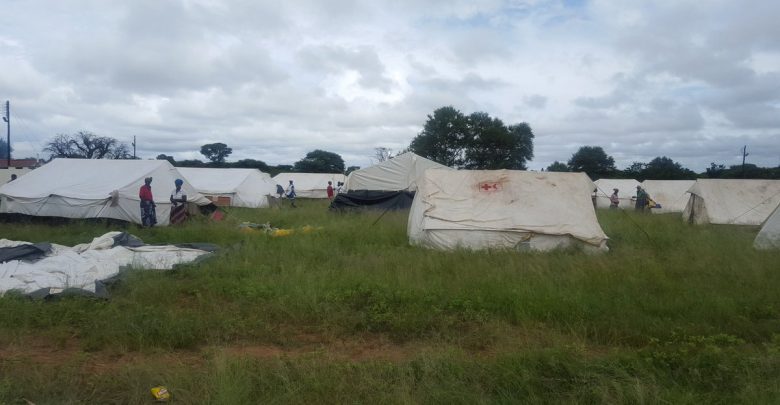Tsholotsho flood victims desert govt sites

By Senzeni Ncube
Victims of Cyclone Dineo in Sipepa village, Tsholotsho are reportedly returning to their homes which are in flood-prone areas due to poor living conditions at Tshino and Sawudweni sites where they were resettled.
Over 300 families were resettled in makeshift tents at transit camps following the 2017 cyclone Dineo which was characterised by heavy winds and torrential rains.
Families in areas which include Mahlasi, Mathaba, Thamuhla, Mbamba, Maphili, Mbanyana amongst other areas were affected.
The Government was reportedly setting in motion a plan to settle villagers on higher ground as a permanent solution to the perennial floods in Tsholotsho.
However, villagers who spoke to CITE who moved from Tshino and Sawudweni sites revealed that some families were leaving the sites due to bad living conditions.
Musa Ndlovu, a villager said the makeshift tents were now old and falling apart.
“The Government did not tell people to leave but as villagers, we have been in this place for almost three years, the tents are now torn and it is now cold as we are in the winter season,” Ndlovu said.
He said they were also restricted to bring their livestock on the sites.
“I am one of the villagers who has gone back to my old home, our livestock is not allowed to the sites we were moved to, so we cannot just leave it unattended just like that,” he said.
Ndlovu said the houses which were constructed by the government could not accommodate everyone.
“At Tshino site there are only eight houses which were roofed but they do not have window panes. At Sawudweni site not many houses have been built,” Ndlovu said.
Another villager who spoke on condition of anonymity said some of the villagers were complaining of hunger.
“We did not even farm around here hence we do not have enough food. Last month we were given 50kg of maize.
“The other month we were given 50kg of millet”, he said.
The villager said they are forced to pay transport costs for the food rations they receive from the government.
“For us to receive that food we are expected to pay RTGS$3 for transport costs. It is not everyone who can afford that amount, so it is better for us to go where we can farm and have enough food for our families”.
Another villager, Moses Ncube revealed that living conditions also affect their cultural life.
“Even if we do not leave the site where can we bury our loved ones if they die,” Ncube said.
Matabeleland North Provincial Administrator Lathiso Dlamini said she was not aware that some of the villagers had deserted their new homes.
“I am not aware of that, what I know is that the Government has built houses for the villagers. So far 69 houses have been built and people were told to share those houses,” Dlamini said.
She said the Government released funds towards the construction of more houses.
“The Government has since released funds towards the construction of more houses but I do not know much we are talking about”, Dlamini said.






